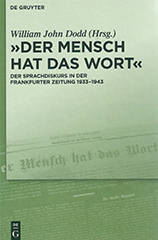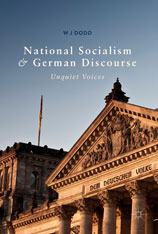I am a member of the research team working on the research project “Inner and outer exile in fascist Germany and Spain: a comparative study”, funded by the Leverhulme Trust.
I would describe myself as a discourse historian with a particular focus on the period from the late nineteenth century to the present. My research ranges across German language and literature and seeks to build a bridge between linguistics and the study of culture.
Major focuses of my research are the writings of Franz Kafka, the literature of ‘inner exile’ in/from the National Socialist dictatorship, and the legacies of discourse traditions. Research awards include a Leverhulme Major Research Fellowship (2000-2002) to work on the papers of Dolf Sternberger, a significant figure in the history of anti-fascist language criticism; and a Senior Research Fellowship at the Alfried Krupp Institute for Advanced Study (Wissenschaftskolleg) Greifswald in 2010-11, to research oppositional discourses of inner exiles during the Nazi period. This Fellowship has led to work on three book projects, two of which are now completed:
 "Der Mensch hat das Wort": Der Sprachdiskurs in der Frankfurter Zeitung 1933-1943. (de Gruyter 2013, available as an E-
"Der Mensch hat das Wort": Der Sprachdiskurs in der Frankfurter Zeitung 1933-1943. (de Gruyter 2013, available as an E-
Book: 978-3-11-031513-4.) This is an edited volume of language-critical pieces in the Frankfurter Zeitung between 1933 and its closure in 1943 (with critical apparatus and an 18,000-word Introduction)
- National Socialism and German Discourse: Unquiet Voices. Palgrave Macmillan 2018 (in press, ca. 300 pp.) This monograph, also intended for readers with little knowledge of German, is a study of National Socialism, discourse, and contemporary German approaches to political discourse analysis. Conceived as a discourse history, it privileges the ‘unquiet voices’ of opponents whose critiques of Nazism, from positions of territorial and inner exile, focused on the ‘language of Nazism’. Discourses on language are a central theme. Individual chapters review ‘precursor’ discourses; Nazi public discourse from 1933 to 1945; the testimonies of ‘unquiet voices’ abroad, and in private and published texts in the ‘Reich’ (including the Frankfurter Zeitung); attempts to ‘denazify the language’ (1945-49), and the legacies of a retrospective discourse of ‘coming to terms’ with the Nazi past. In the period from 1945, the book focuses on contestations of ‘tainted language’ and instrumentalizations of the Nazi past, and the persistence of linguistic taboos in contemporary German usage. A keyword index of discourse-relevant items is supplied.
 1. Introduction: Towards a Discourse History of National Socialism
1. Introduction: Towards a Discourse History of National Socialism- 2. The Emergence of National Socialist Discourse
- 3. The National Socialist Discourse “Community”: Norms and Contradictions
- 4. Voices from Abroad: Mann, Kraus, Bloch, Brecht, Keun, Paechter
- 5. Voices at Home (I): Private Notes for Posterity
- 6. Voices at Home (II): From Resistance to ‘Resistenz’ in the Printed Word
- 7. Voices at Home (III): The Case of the Frankfurter Zeitung
- 8. Aftermath: ENTNAZIFIZIERUNG
- 9. Legacy: VERGANGENHEITSBEWÄLTIGUNG
- 10. Conclusion
- Appendix
- Bibliography
- Index
- Discourse-Relevant Expressions
- Benjamin/ Sternberger: A Case Study in the Fractured Discourse of German Exile 1933-1945 (in progress).This study provides the first detailed reading of Dolf Sternberger's book PANORAMA ODER ANSICHTEN VOM 19. JAHRHUNDERT (Hamburg, 1938), largely rejecting Walter Benjamin’s attack on it as a document of conformity, and arguing instead for a morphology of exile which views the discourses of inner and territorial exile as related ‘dialects' (as set out in my article “Sternberger’s Panorama: Approaches to a work of (inner) exile in the National Socialist period’, Modern Language Review 108/1, 180-201.